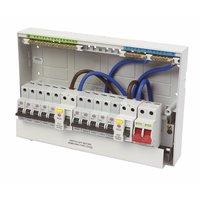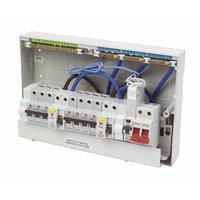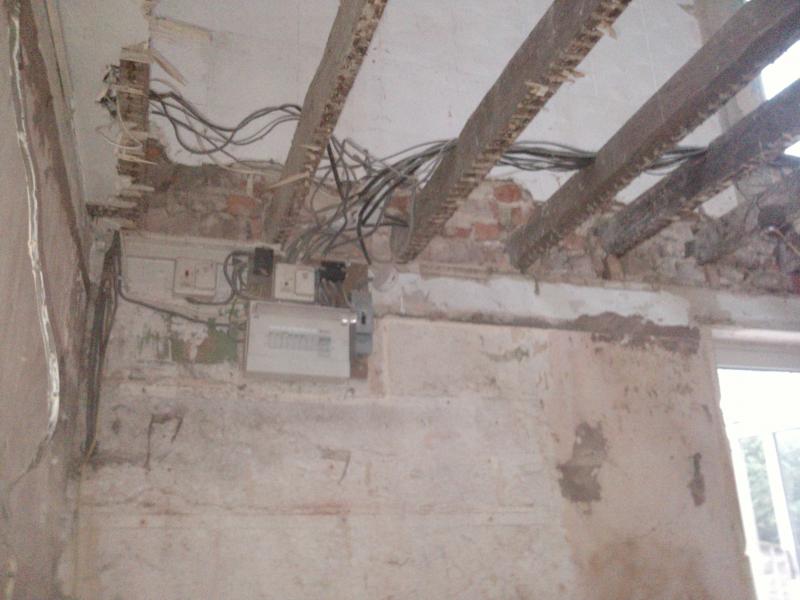Hello all, need some info about what the 17th edition regs have added to the 16th edition as I am about to re-wire a whole house.
I re-wired my own house to full regs and got it signed off but don't know about what 17th edition says about RCBO's.
I will be fitting out with a split load cb with each side having it's own 63A 30mA RCD's with one side protected with a RCBO.
I take it the side with the RCBO has to protect the high risk areas such as bathroom areas and its lighting.
As both these circuits will be upstairs this poses no problem but...outside lights and kitchen??; do these areas and their circuits require an RCBO also.
Locations containing a Bath or a Shower particularly the changes from the 16th Edition are substantial:
Zones 0, 1 and 2 as defined in the 16th Edition are retained. Zone 3 is being removed.
OK, I can get this, they are tightening up on what can go where.
New regulations require all circuits supplying equipment in the bathrooms to be protected by 30 mA RCD's.
Yes, I understand this also, the cb will have two-one per split load, so I have got two fuseboards with 63A 30 mA RCD protection
over the MCB's they power within one big box of tricks.
All cables buried in walls surrounding bathrooms regardless of the points they are serving have to be protected by 30 mA RCD's.
Sure,new cb's have one or two RCD's as standard so all the last points are covered but this bit I do not get.
Supplementary Bonding between metallic service and waste pipes and the earth connections of equipment is no longer required providing the main
bonding of services within the property is in place and the metallic pipework can be proved by testing to be continuous.
This means that the need for green and yellow cables in bathrooms is unlikely to be necessary.
So..call me stupid (please feel free), do I actually require a cb with RCBO's covering all circuits or is this overkill and where did the earth rod go in all this.
(please feel free), do I actually require a cb with RCBO's covering all circuits or is this overkill and where did the earth rod go in all this.
Is it now defunct or 'an also' because the regs also state that you should design a system that will not trip out on a regular enough basis to become a nuisance.
After all this can begin I know that I will have to inform the building control board from my local area, but I do not wish to fall flat on my face on day one over something silly.
Please can anyone help me out with this
Regards, Rob/Mug/Tea maker/Dogsbody/Labourer/Foreman...oh yes...and Plumber but thats another story!
I re-wired my own house to full regs and got it signed off but don't know about what 17th edition says about RCBO's.
I will be fitting out with a split load cb with each side having it's own 63A 30mA RCD's with one side protected with a RCBO.
I take it the side with the RCBO has to protect the high risk areas such as bathroom areas and its lighting.
As both these circuits will be upstairs this poses no problem but...outside lights and kitchen??; do these areas and their circuits require an RCBO also.
Locations containing a Bath or a Shower particularly the changes from the 16th Edition are substantial:
Zones 0, 1 and 2 as defined in the 16th Edition are retained. Zone 3 is being removed.
OK, I can get this, they are tightening up on what can go where.
New regulations require all circuits supplying equipment in the bathrooms to be protected by 30 mA RCD's.
Yes, I understand this also, the cb will have two-one per split load, so I have got two fuseboards with 63A 30 mA RCD protection
over the MCB's they power within one big box of tricks.
All cables buried in walls surrounding bathrooms regardless of the points they are serving have to be protected by 30 mA RCD's.
Sure,new cb's have one or two RCD's as standard so all the last points are covered but this bit I do not get.
Supplementary Bonding between metallic service and waste pipes and the earth connections of equipment is no longer required providing the main
bonding of services within the property is in place and the metallic pipework can be proved by testing to be continuous.
This means that the need for green and yellow cables in bathrooms is unlikely to be necessary.
So..call me stupid
Is it now defunct or 'an also' because the regs also state that you should design a system that will not trip out on a regular enough basis to become a nuisance.
After all this can begin I know that I will have to inform the building control board from my local area, but I do not wish to fall flat on my face on day one over something silly.
Please can anyone help me out with this
Regards, Rob/Mug/Tea maker/Dogsbody/Labourer/Foreman...oh yes...and Plumber but thats another story!




